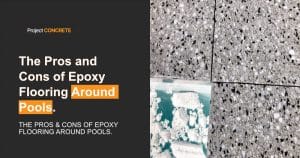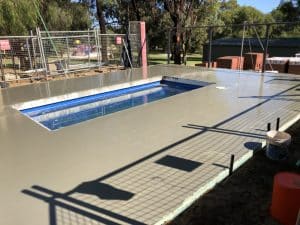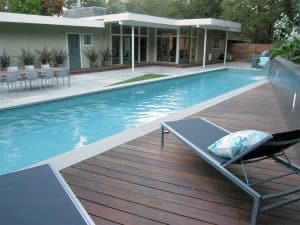
Is epoxy flooring the right fit for poolside durability, cost-efficiency, and safety? This guide cuts through the fluff to examine its effectiveness in aquatic environments. Move past the sales talk and delve into essential details regarding its installation and upkeep, as well as a straightforward evaluation against other pool decking options.
Epoxy Flooring for Poolside Surfaces
Selecting the right flooring for a swimming pool area is crucial, and epoxy flooring stands out as a top contender. The smooth, polished finish of epoxy flooring not only enhances the visual appeal of swimming pool space but also offers a sturdy surface.
Epoxy is highly durable, making it an ideal choice for pool decks, which often face continuous use and are exposed to the challenging effects of water and sunlight. This type of flooring is designed to withstand these conditions, providing a long-lasting and visually appealing solution for any pool area.

Advantages of Epoxy Flooring Around Pools
Epoxy flooring is increasingly becoming the go-to choice for pool decks, thanks to its many advantages. This flooring option not only offers an attractive appearance but also provides a slip-resistant, slippery surface and is easy to maintain, making it a top choice in pool deck materials.
Aesthetic Appeal
Epoxy flooring enhances the look of pool decks with its seamless, glossy, or matte finish, adding a sophisticated touch to the area. It’s reflective quality not only elevates the area’s beauty but also its functionality. Homeowners have the flexibility to customize their epoxy pool flooring to match the architectural style of their house or outdoor décor, making it versatile for various design preferences.
Slip-Resistance
Safety is paramount for pool decks, and epoxy flooring contributes significantly to this by offering a slip-resistant surface. It outperforms many other smooth surfaces in wet conditions due to its textured finish, which a slip resistant coating that is achieved by incorporating anti-slip additives and aggregates. The high friction coefficient of epoxy flooring, ranging from 0.50-1.00, indicates its excellent slip resistance, reducing the likelihood of accidents like slips and falls. Its resin-based composition further enhances this feature, offering effective traction and water resistance.
Low Maintenance and Easy Cleaning
Another significant benefit of epoxy flooring for pool decks is its low maintenance requirement. Its non-porous nature means that harsh chemicals aren’t necessary for cleaning, and regular maintenance is sufficient to keep it in good condition. For cleaning, neutral-PH soap, hot water with hard mop, simple green, or ammonia can be used, emphasizing the ease of upkeep. This convenience and minimal maintenance make epoxy flooring an appealing choice for those seeking an effortless yet effective flooring solution for their pool areas.
Disadvantages of Epoxy Flooring Around The Swimming Pool
While epoxy flooring for pool decks offers numerous advantages, it is important to consider its possible disadvantages. These include vulnerability to UV rays, potential slipperiness when wet, and the initial cost of installation.
Sensitivity to UV Rays
One of the primary concerns with epoxy flooring is its vulnerability to UV rays. Continuous exposure to these rays can trigger a chemical response in the top coating of epoxy floor,, resulting in yellowing and discoloration. This can lead to a loss of glossy finish and fading, which affects both durability and visual appeal.
Thankfully, this problem can be addressed by periodically applying a protective coating every 5-7 years or as recommended by an expert on epoxy flooring maintenance for coating your pool deck. With this precautionary measure, you can ensure that your pool’s surface retains its vibrant color and glossiness for many years ahead.
Potential Slipperiness
While epoxy flooring is known for its slip-resistant properties, exposure to substances such chemicals such as oils and water can make it slick and create a potential safety hazard. To address this issue, there are several solutions available.
- Adding anti-slip additives during the installation process.
- Applying textured coatings on top of the epoxy surface.
- Using rubber mats in areas where slips may occur.
It is also important to regularly maintain your pool deck and walk, by following proper cleaning procedures to ensure a safe walking surface.
Installation Costs
The installation cost of epoxy flooring can be comparatively high depending on the size and specific requirements of a project. It ranges from $30 to $35 per square meter or $3-$12 per square foot, covering the expenses for material, surface preparation and labour.
While this initial expense for epoxy resin may seem steep, considering its durability and low maintenance needs over time, epoxy flooring is a practical choice in terms of long-term savings. With proper upkeep and occasional topcoat reapplication, this type of flooring has the potential to last for decades without significant wear-and-tear concerns.

Alternative Pool Deck Materials
Other than epoxy flooring, there are a variety of options available for your pool areas and decks. It is important to consider the following alternative materials when deciding on what best suits your needs for your pool area and deck.
Concrete Pavers
For pool decks, many people are choosing to use concrete pavers as an alternative to epoxy flooring. This is because the interlocking design and aggregate mix of pavers make them less likely to crack than poured concrete. While they may require regular upkeep like specialized cleaning solutions or pressure washing in order to protect the concrete, these maintenance efforts pay off by providing durable resistance against chlorine and salt.
Although maintaining a deck made with concrete pavers involves more work compared to other options, their aesthetic appeal cannot be denied. These rustic-looking paving stones add charm and attractiveness that can’t quite be matched by sleeker materials such as epoxy flooring which give pools a modern feel instead.
Timber Decking
Timber decking is a viable option for those looking to add natural and cozy vibes to their pool area. It offers versatility, making it especially attractive for families with children. Regular maintenance is necessary in order to prevent water damage and preserve its appearance.
Despite the upkeep involved, timber decking remains popular due to its visually appealing look and slip-resistant surface. In hot climates it can provide insulation properties which adds appeal. Investing in timber decking has been known to increase property value.
These factors contribute greatly towards the desirability of using timber decking around pools or other outdoor areas that require such features.
Natural Stone
A pool deck made of natural stone is a long-lasting and appealing choice. Its ability to withstand moisture, temperature changes, and pressure makes it ideal for outdoor spaces with water exposure, such as pools. There are various colors and textures available in natural stone that can complement any style, be it rustic or modern.
The cost of using natural stone for a pool deck ranges from $15 to $40 per square foot depending on the type chosen. Although pricier than other materials, its durability justifies the investment in your pool area’s overall longevity.
Epoxy Flooring Vs Other Materials Around The Pool
When it comes to choosing the right material for your pool area, it’s essential to compare the pros and cons of various options. While concrete pavers, timber decking, and natural stone each have their merits, epoxy flooring often emerges as the superior choice for several compelling reasons.
Durability and Maintenance
Epoxy flooring is renowned for its exceptional durability and ease of maintenance. Unlike concrete pavers that require regular cleaning and are prone to cracking, epoxy surfaces maintain their integrity over time with minimal upkeep. Timber decking, while visually appealing, demands frequent maintenance to prevent water damage. Natural stone, though long-lasting, comes with a higher cost and requires meticulous installation. Epoxy, in contrast, offers a resilient surface that withstands the rigors of pool use and is effortless to clean.
Aesthetic Flexibility
Epoxy flooring surpasses other materials in terms of design versatility. It offers a wide range of colors and patterns, allowing for complete customization to match any architectural style or personal taste. While timber decking adds a natural look and natural stone brings a space a rustic charm, epoxy flooring can be tailored to mimic these textures or create entirely unique designs, making it an adaptable choice for any pool area.
Safety and Comfort
Safety is paramount in pool areas, and epoxy flooring excels the surrounding area with its slip-resistant properties. While timber and natural stone can become slippery when wet, epoxy can be formulated with anti-slip additives to provide a safer walking surface. This is especially important in a pool environment where wet surfaces are common.
Summary
Selecting the right material for your pool deck is a decision that should balance both aesthetics and safety. By implementing regular maintenance and considering options like adding non-skid elements or specialized coatings, you can ensure a safe and enjoyable pool experience. High-quality epoxy flooring from Project Concrete is an excellent choice for any wet environment, whether it’s in residential settings or commercial spaces with recreational amenities. It offers a perfect blend of beauty, durability, and low maintenance, enhancing your living experience with a touch of leisure.
Epoxy flooring, with its attractive appearance and resilience, stands out as a top choice for pool decks. However, it’s important to be aware of its few limitations, such as sensitivity to UV rays, potential slipperiness when wet, and the initial investment in installation.
For those exploring alternatives, materials like concrete pavers, timber decking, and natural stone are viable options, each with its own benefits and drawbacks. As you consider the best solution for your own pool deck and area, turn to Project Concrete for expert advice and installation. Our team at Project Concrete can guide you through the process, ensuring you choose a pool deck material that meets your needs for style, safety, and longevity. Contact Project Concrete today to transform your pool deck into a stunning and secure area for relaxation and enjoyment.
